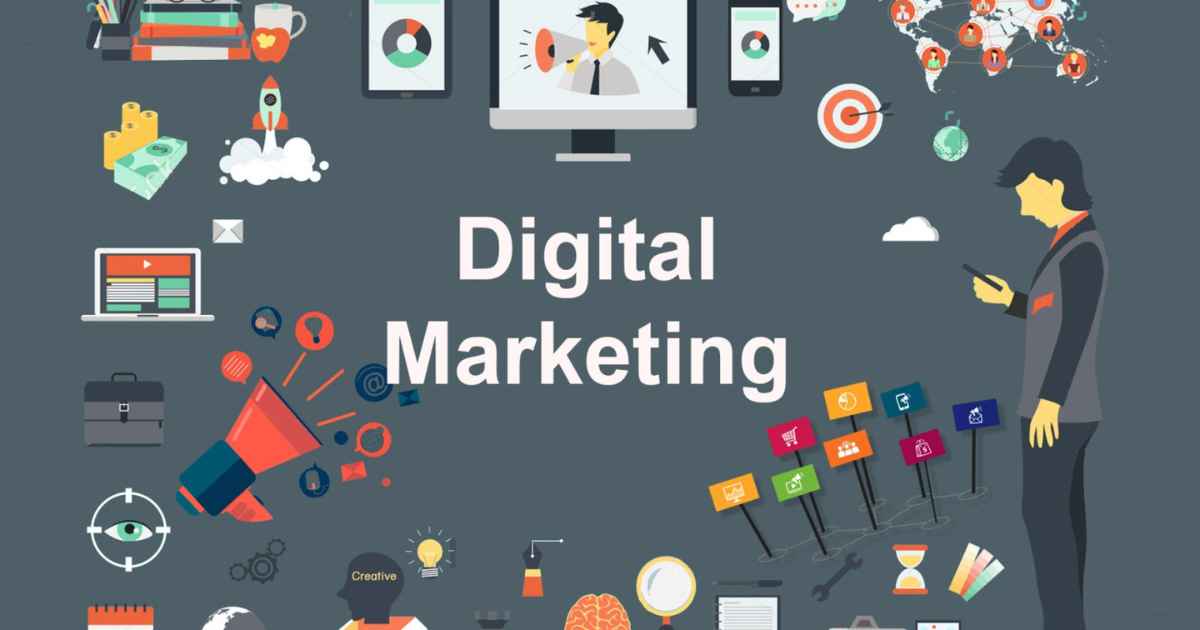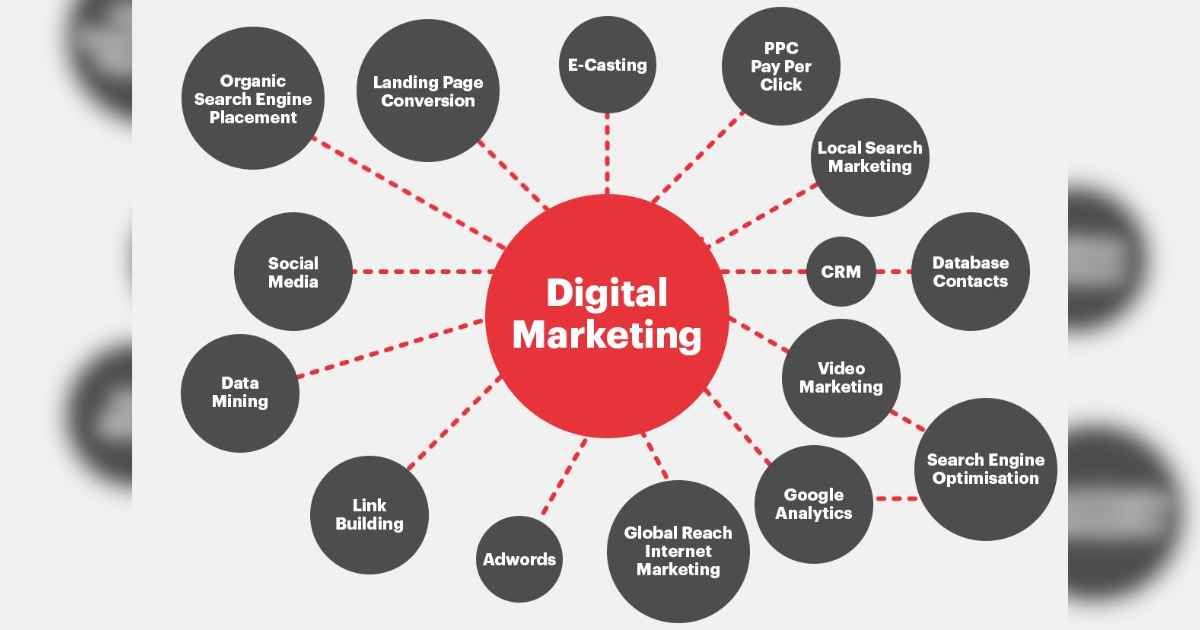
Plan the Perfect Winter Wedding: Top Destinations in India
Plan the Perfect Winter Wedding: Top Destinations in India In India, winter weddings weave a wonderful web of cold weather, love, and rituals. This is the season that wedding couples

The use of digital channels to promote goods and services to customers is referred to as “Digital Marketing“. This type of marketing uses websites, mobile devices, social media, search engines, and other channels with similar functions.
The use of the Internet, mobile devices, social media, e-mail, search engines, and other channels to reach your target audience is known as Digital Marketing.
The average user nowadays consumes content through television, computer, tablet, smartphone, and other traditional media. Constant exposure to many forms of media has resulted in Information Overload, complicating the Buyer’s Journey even more.
Brands can stay relevant by being present across several channels and touchpoints thanks to Digital Marketing.
Marketers are now using these digital channels to lead prospects through the purchase process and stay in touch with existing customers.
Digital Marketing aims to promote goods, services, or brands, using multiple internet channels and platforms. It involves using digital technology and methods to engage with target audiences, connect with potential consumers and generate desired actions such as sales, lead generation, website traffic, or customer interactions.
Businesses can reach a global audience with digital marketing, regardless of regional boundaries. Brands can expand their audience and increase online visibility through the use of social media, search engines, websites, and email.
Using demographics, interests, behavior, and other criteria, digital marketing makes it possible to target audiences precisely. As a result, marketing conducted by businesses is more effective because they are focusing on the most relevant and potential customers.
Digital marketing often offers a more cost-effective approach to reaching and engaging with a wider audience than traditional types of marketing. For example, online advertising enables variable budget allocation and real-time campaign effectiveness monitoring.
Businesses can track the performance of their efforts in real-time thanks to the rich analytics and tracking capabilities provided by digital marketing. To evaluate the success of a marketing initiative, metrics including website traffic, click-through rates, conversion rates, and more can be tracked.
Digital marketing enables personalized customer communication through data segmentation and analysis. Customer engagement and conversion rates can be increased significantly by customizing messaging and offers according to individual tastes and behaviors.
Social media platforms and other digital channels make it easy for brands and customers to have a two-way conversation. This connection strengthens bonds, encourages patron loyalty, and collects feedback for ongoing development.
With the help of digital marketing, a consistent brand identity is established and maintained across various online platforms. Building a strong brand presence involves creating useful content and engaging with an audience.
Many digital marketing techniques, including content marketing, email marketing, and search engine optimization (SEO), aim to attract potential customers who are interested in a company’s goods or services in order to generate leads.
The main objective of digital marketing is to increase conversions and sales. Businesses attempt to convert leads into paying customers by leading potential customers through the marketing funnel and offering an engaging call-to-action.
Businesses can rapidly modify their strategy using digital marketing in response to changing market trends, consumer preferences, and technology developments. This adaptability is essential in today’s rapidly changing digital environment.
In short, digital marketing is an important tool that helps companies reach their target market, advertise their products, and meet their marketing and commercial goals in the digital age.

Digital marketing channels are the various internet channels and platforms that companies use to advertise their goods, services, or brands to potential customers. Through these channels, organizations can connect with potential customers, engage them, and encourage necessary actions.
Given below is an overview of some popular digital marketing channels:
All digital marketing efforts revolve around a website. It is a very effective channel on its own, but it also serves as the platform for many different web marketing efforts. A website should communicate a brand, a product, and a service in an understandable and memorable way. It should be quick, responsive, and easy to use.
Search Engine Optimization(SEO) involves making adjustments to the content and structure of a website to improve its position in search engine rankings. The goal is to increase organic (non-paid) traffic by increasing website visibility to users searching for relevant keywords.SEO consists of ON-PAGE and OFF-PAGE activities to Boost your website’s visibility in Search Engine Result Pages for your preferred Keywords.
Businesses connect with their audiences through social media platforms such as Facebook, Instagram, Twitter, LinkedIn, and others, posting content, running ads, and engaging in conversations.
Social media marketing boosts customer engagement and brand exposure.
Some of the Top Social Media Channels you can use in Social Media Marketing include:
YouTube
Content marketing involves creating and sharing valuable, relevant content to attract and engage a target audience. Typically, content is published on a website and then promoted using social media, email marketing, SEO, or even PPC campaigns.
The channels that can play a part in your Content Marketing Strategy include:
Blog Posts
Articles
Videos
Ebooks
Infographics
PPC is a strategy of increasing website traffic by paying a publisher every time your ad is clicked. Google Ads is one of the most common types of PPC, allowing you to pay for top spots on Google Search Engine Results Pages at a cost “Per Click” of the links you place.
Some of the other Channels you can use PPC includes:
Paid Ads on Facebook
Twitter Ads Campaigns
Sponsored Messages on LinkedIn
In Affiliate Marketing, businesses partner with affiliates who promote their products on their websites or platforms.
Affiliates earn a commission for each sale or action generated through their referral link.
Email marketing is a way to communicate with potential customers or people who are interested in your brand. Many digital marketers use all other digital marketing channels to add leads to their email lists, then employ Email Marketing to transform those leads into customers.
Influencers are people who have a large number of online followers who work with brands to promote their goods or services. Influencers can help increase brand awareness and brand trust by leveraging their authority.
Visual ads, known as “display ads“, can be found on applications, websites, and social media platforms. They can be eye-catching banners, photos, movies, or interactive media.
Platforms like YouTube are used for video marketing as the demand for video content increases. To engage their audience, brands create educational, entertaining, or promotional videos.
These channels can be employed singly or in combination, to develop a complete digital marketing plan that meets a company’s objectives, target market, and industry.
The channels chosen depend on a number of variables, including the nature of the business, the preferences of the target audience, and the resources at hand.

Plan the Perfect Winter Wedding: Top Destinations in India In India, winter weddings weave a wonderful web of cold weather, love, and rituals. This is the season that wedding couples

Discover the Best Family Trip Destinations in India 2024: Fun for All Ages While it might not be the most obvious destination for a family cruise vacation, if you’re willing

25 Delicious Indian Food You Must Try Once When you want to try delicious Indian food that is full of different flavors, textures, and novelty, the same old options don’t

Making money online is the easiest way, even though it is not easy. But developing your talents will also require time, effort, and energy to meet your financial goals ultimately.
Top Indian Blogs | Top Blogs in India | Top Bloggers in India | Top Indian Bloggers | Bloggers in India | Best Bloggers in India | Indian Top Blogger | Bloggers of India
Food Blogger | Food Blogs Indian | Food Bloggers In India | Food Bloggers India | Food Blogs India | Indian Food Bloggers | Indian Food Blog
Travel Blogger | Travel Bloggers India | Indian Travel Blogger | Indian Travel Bloggers | Travel Blogger India | Travel Bloggers in India | Travel Bloggers of India | travel Blogs in India | Travel Blogs India
Digital Makketing Bloggers | Blog on Digital Marketing | Blogs On Digital Marketing | Blog For Digital Marketing | Blogs about Digital Marketing | Best Digital marketing blogs
Wedding blogs in india | indian wedding bloggers | wedding blogs india | best wedding bloggers | wedding bloggers india
1 thought on “What Is Digital Marketing | Importance Of Digital Marketing | Online Marketing | Offline Marketing”